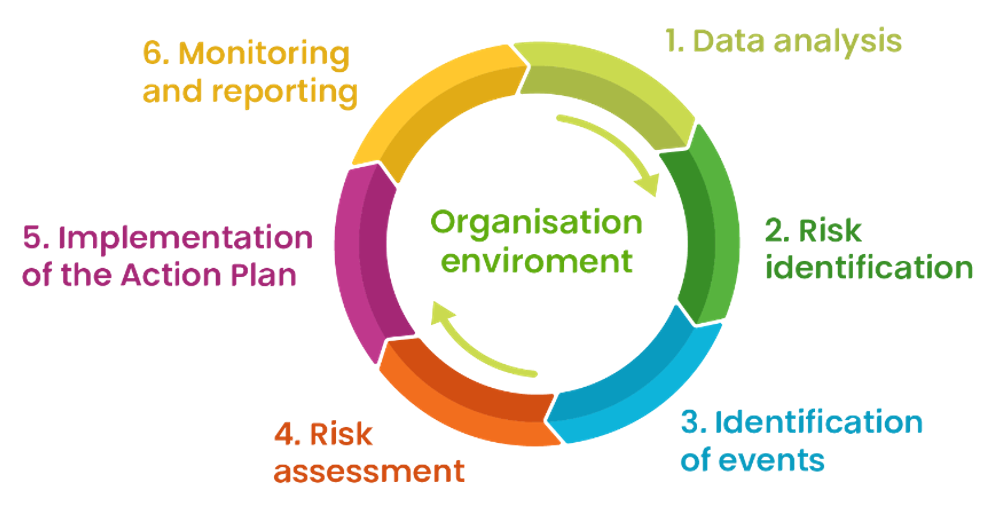The article by PKF expert (Grażyna Sadowska- Malczewska – Managing
Partner of PKF BPO).
How to use accounting in management? We answer questions about your
business.
As Bill Gates says, decisions based on superficial intuition can be costly for
entrepreneurs. In recent years, challenges such as the pandemic and the conflict in Ukraine have shown how volatile
and unpredictable economic conditions could be. Continuous macroeconomic changes and economic uncertainty require not
only vigilance but also strategic risk management from entrepreneurs.
In PKF, we understand that financial management goes beyond basic accounting and HR.
Therefore, we are launching a series of publications on management accounting and controlling, as well as the role
they play in making important decisions and optimizing operations.
Part 1. The impact of unfavorable macroeconomic indicators on your business.
What are the macroeconomic indicators for 2023 and how do they translate into
the operation of businesses?
Macroeconomic indicators are crucial for the operation of businesses, especially in the
face of difficult years for global economies.
Accumulated inflation has reached almost 35% over the
past four years, with an annual rate of 11.4% for 2023, which has an adverse effect on the economy. The growth in
inflation leads to higher prices and salary pressures, forcing companies to further increase their prices to maintain
profitability. This vicious circle may cause liquidity problems and affects costs of funding, while economic
uncertainty drives exchange rate fluctuations.
Below is a summary of the main macroeconomic indicators for 2023 as
well as their impact on the standing of businesses.
MINIMUM SALARY
Impact on the economy (macro scale)
Year 2023: the minimum salary increased twice.
- in January 2023: from PLN 3,010 to PLN 3,490
- in July 2023: PLN 3,600
Year 2024: the minimum salary will increase twice, with record-breaking
increases by over 20% compared to the previous year:
- from January 2024: PLN 4,242
- from July 2024: PLN 4,300
From the pre-pandemic 2020, when the minimum salary was PLN 2,600, until July 2024, when
the minimum salary is to amount PLN 4,300, the growth rate is over 165%!
Dynamic increases in the minimum salary have a direct impact on the inflation
and price increases.
Impact on the economy (micro scale)
Increases in the minimum salary have the biggest impact on industries
with the majority of employees with lower competences. Apart from this, each company has costs that depend on the
amount of the minimum salary. Such a major change will not be without significance for the labor market. In addition
to positive effects, such as an increase in the salaries of some employees, there will be a number of negative
effects, such as further flattening of salaries or a significant increase in costs of labor, which is not covered by
the sales growth rate. This has an impact on the profitability of many companies, which in a negative scenario may
lead to bankruptcy. As a result of declining profitability, many businesses have to increase prices, which
simultaneously fuels inflation.
AVERAGE MONTHLY SALARY IN THE CORPORATE SECTOR
Impact on the economy (macro scale)
Year 2023: The average monthly salary in the corporate sector reached
PLN 8,032.96, an increase by 9.6% compared to the previous year.
Year 2024: Experts expect that an upward trend of
close to 10% will be continued.
Impact on the economy (micro scale)
In service industries, salaries often account for the largest portion of costs.
Unless offset by an adjustment of sales prices, the continuous pressure on salary growth
may lead to a drop in profitability.
In order to effectively respond to changing market trends, the profitability of a
business should be monitored on a regular basis. Monitoring should be performed not only at the level of the entire
organization but also at the level of individual departments, groups of services or products.
CHANGES IN RAW MATERIAL AND ENERGY PRICES
Impact on the economy (macro scale)
The conflict in Ukraine caused supply chain disruptions, which also translated into
a dynamic increase in prices in energy markets. This translated directly into an increase in costs of
raw materials and supplies. The price growth had a particularly strong impact on the construction, transport and
production sectors.
Impact on the economy (micro scale)
Anticipating the growth in raw material prices, some businesses have opted for early
stocking, which allowed them to secure access to goods, materials and raw materials. Price volatility and
unpredictability caused by the disrupted supply chain, have created risks that affect business profitability.
This year, many companies will have to face new, higher prices in the
market. As with rising salaries, failure to properly adjust sales strategy may have an adverse effect on
profitability.
It should be remembered that excessive stocking to ensure access to raw materials and
supplies at lower prices has consequences in terms of deteriorated liquidity and turnover ratios.
Where adverse macroeconomic trends affected customers of a business and caused problems
with their liquidity, that may have an adverse effect on the receivables turnover ratios of the latter. Consequently,
this may also affect the liquidity of the business.
INTEREST RATES
Impact on the economy (macro scale)
The reference rate of the NBP has remained unchanged since October
2023. It amounts to 5.75% p.a., which is by 1 p.p. lower than at the end of 2022.
The year 2022 was a record-breaking year in terms of interest rates,
which resulted in a drastic increase in costs of funding and had an adverse effect on the standing of
many businesses. However, upcoming stabilization is forecasted as well as following decline in interest rates.
Impact on the economy (micro scale)
The decline in interest rates is the decline in costs of funding, and thus a relief to
the budgets of businesses, in which interest has so far been an important element.
Funding structure analysis. The present moment is good to review the
funding structure of a business, assess liquidity ratios and examine the possibility of building a more efficient
funding structure and thus optimize costs of debt service.
Investment potential. A decrease in costs of funding opens up greater
investment opportunities. If investment decisions have so far been postponed due to high costs, it is time to
reconsider and reevaluate investment plans.
PLN EXCHANGE RATE
Impact on the economy (macro scale)
In 2023, the Polish zloty strengthened against major currencies such as
the US dollar and the euro. Compared to 2022, we paid on the average by 6% less for the US dollar and 3% less for the
euro.
Exchange rate trend analysis. The change in the exchange rate trend was
particularly noticeable at the end of the year. On the last day of 2023, compared to the last day of 2022, the US
dollar rate fell by as much as 11%. The corresponding reduction for the euro was 7%.
Impact on the economy (micro scale)
Large fluctuations in foreign exchange rates have a direct effect on the financial
position of the businesses that make significant transactions and settlements in foreign currencies.
These changes are detrimental to companies with significant foreign currency revenues,
while businesses with a high share of foreign currency costs can benefit from them.
Therefore, it is worth looking closely at profitability and liquidity ratios to assess
how the strengthening of the Polish zloty has affected the financial results of companies; it is also worth
considering to hedge currency volatility.
GDP
Impact on the economy (macro scale)
Polish GDP slowed down significantly in 2023, and reached only 0.2%
compared to 5.3% in 2022.
Excluding the period of the pandemic, this is the worst result for decades and the lowest since Poland joined the
European Union.
High interest rates and inflation are identified as the main
reasons for this, resulting in lower private consumption and lower foreign demand.
Such an economic slowdown has a significant effect on the circulation of money in the
economy, which could deepen the recession. This may also add to further contraction in demand and consumption.
Impact on the economy (micro scale)
In many businesses, the economic slowdown may lead to a drop in sales.
In addition, liquidity problems, coupled with increased costs of funding and more stringent requirements for obtaining
funding (such as loans and borrowings), may threaten corporate stability of companies or even result in their
bankruptcy.
Effects of adverse macroeconomic conditions
In 2023, Poland saw a record-breaking increase in the number of corporate
bankruptcies, reaching nearly 5 thousand companies, the highest number since 2016. In particular, the crisis
hit the transport, manufacturing and construction sectors, partly due to the delayed consequences of lockdowns.
Businesses should monitor not only their own financial situation but also the standing of key accounts in order to
prepare for potential payment backlogs.
How to identify, respond and manage risks?
In the face of difficult macroeconomic conditions, in order to be able to
effectively respond to changes and secure one’s own operations, it is necessary to implement risk
management systems based on a continuous cycle of operation, which is presented in the diagram below:

Ongoing monitoring of financial indicators and evaluation of
consequences of macroeconomic and market changes, including the standing of key accounts, as
well as competitor and supplier actions, provide effective risk control. The risk management system in place allows to
quickly adapt to the upcoming changes, make the right strategic decisions and create competitive business.
What are the benefits of ratio analysis?
- It allows to assess the financial standing of the business
- It presents relations and connections between individual items of financial
statements, which translates into information about individual business processes
- It allows for benchmarking against your competitors
- It allows to analyze trends
- It identifies red flags and allows for an early response to the risk in your
organization
- It allows for effective long-term development planning
Should you want our expert to look into the ratio analysis in your organization, do not
hesitate to contact us. Discover the full range of our capabilities at PKF BPO!
In addition to accounting, HR and payroll services, we also offer comprehensive
management accounting and controlling solutions. Should this topic be of interest to you or should you have any doubts
as to what financial data are crucial for the current situation of your business, please consult our
management accounting and controlling expert free of charge.
This is a perfect opportunity to obtain professional support and answers to your
business-related questions.
WOULD YOU LIKE TO INCREASE THE EFFICIENCY OF YOUR BUSINESS? Contact us!




